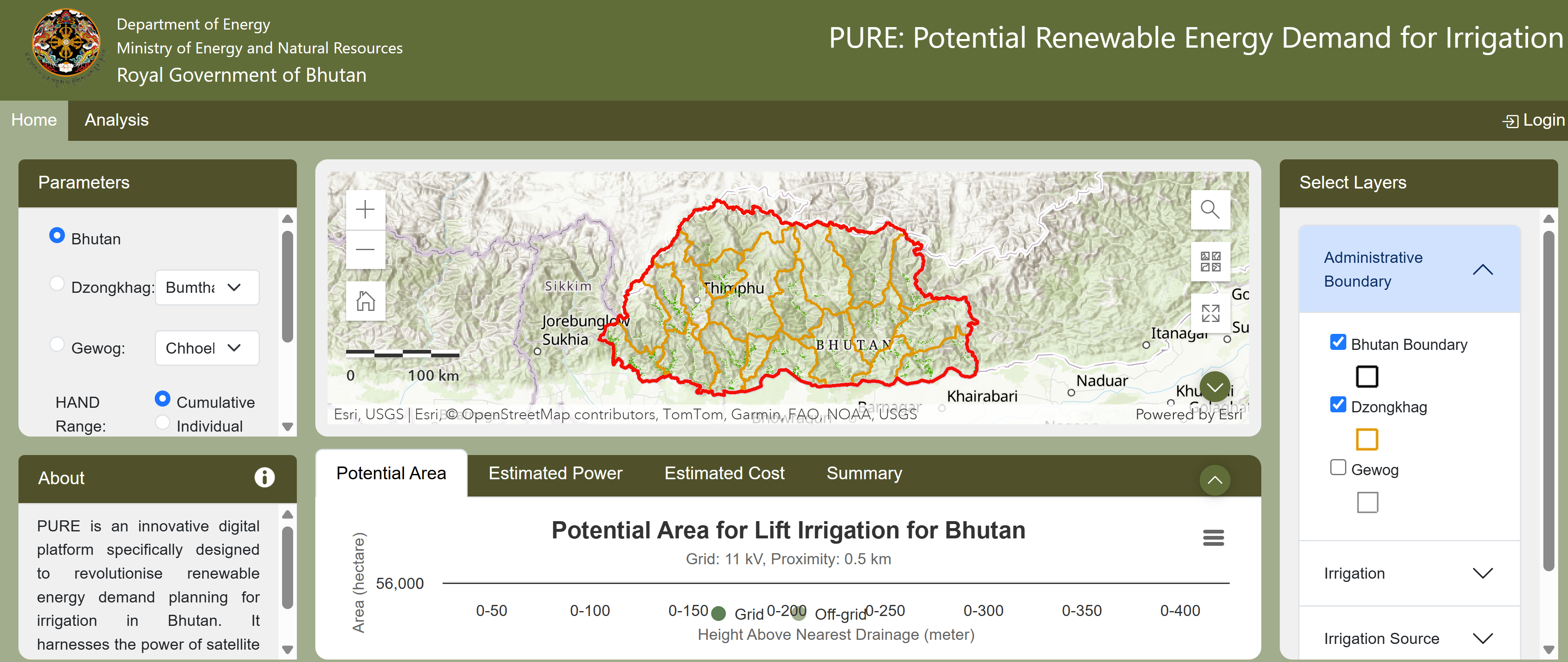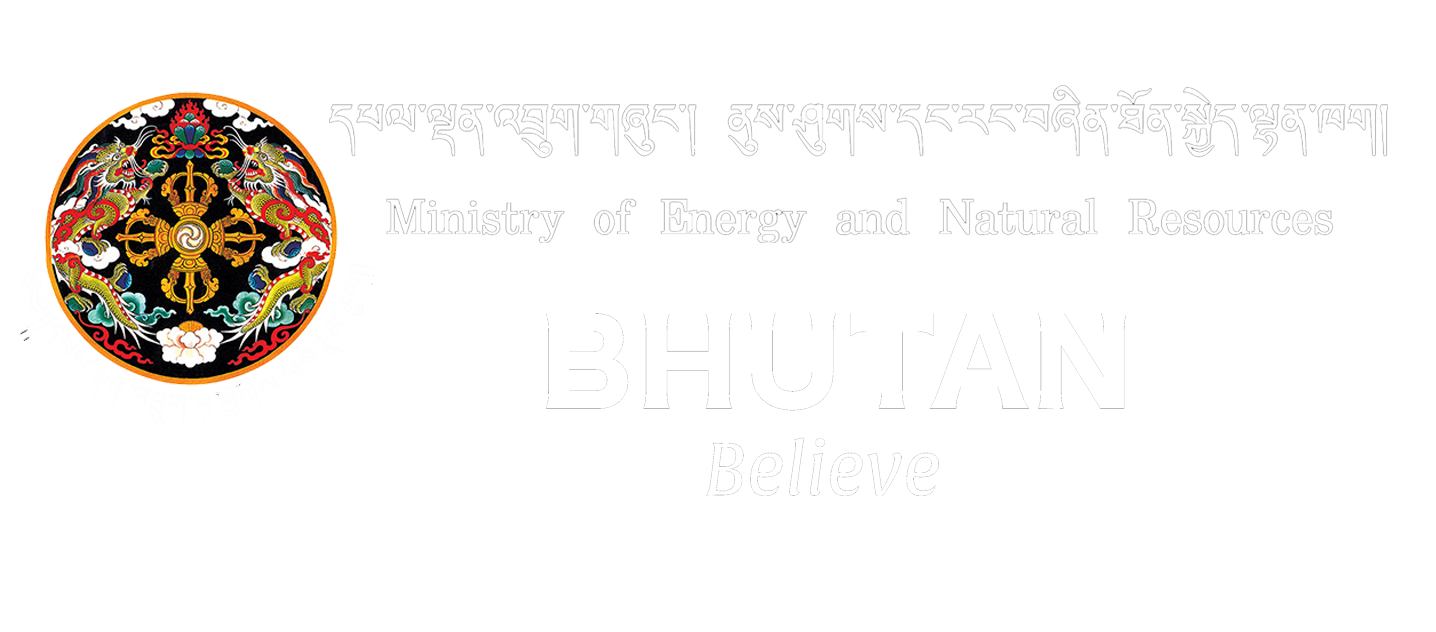- Vision
- Mission
- Organogram
- Mandates of Department of Energy
- Mandates of Energy Strategy & Planning Division
- Mandates of Energy Resource Development Division
- Mandates of Power Systems & Market Division
- Mandates of Energy Innovation & Management Division
- PURE PLATFORM
- Power Allocation Service
Energy security for economic prosperity, social progress and the well being of Bhutanese.
Achieve energy security by harnessing green energy resources, and adoption of transformative and innovative technological solutions.

- Serve as the central coordinating agency and the focal point on all matters related to energy, power systems and energy markets including cross-border trade of electricity.
- Formulate national energy policies, plans, procedures, and guidelines for sustainable development, planning, construction, promotion, efficient utilisation and management of energy resources and power systems, and cross border trade of electricity.
- Undertake sustainable development, utilisation and management of renewable energy resources with deployment of modern state-of-the-art technologies/ systems.
- Ensure sustainable energy security for the country by adopting transformative and innovative technologies, along with steady state and dynamic energy supply and demand analysis.
- Promote reliable, safe, equitable and quality supply of energy to the domestic market.
- Approve/ sanction techno-economic clearances for DPR/ Feasibility studies, and issue/enforce concessions and agreements for development, construction and management of energy resources and energy infrastructures.
- Enhance productivity and energy savings through energy efficiency and conservation measures.
- Review and assess power markets, cross border negotiations on power trade and tariffs including undertaking initiatives for energy market diversification.
- Address emerging threats to critical energy infrastructure and national emergency responses related to energy.
- Promote and conduct applied research, development, demonstration and adoption of clean, green, emerging and innovative technologies.
- Reduce dependency on use of fossil fuels by substitution with renewable energy.
- Assess and provide technical advisory services on the energy and climate change related national issues, including accessing carbon markets for renewable energy projects.
- Create enabling eco-systems for participation of Bhutanese in the construction of renewable energy projects including providing goods and services.
- Introduce suitable energy sector reforms for growth and enhancing delivery of service; and
- Facilitate and mobilise resources and project structuring including access to green bonds, climate funds and carbon markets and other innovative financing mechanisms in coordination with relevant agencies.
- Formulate national energy policies and development plans.
- Carry out investment planning and strategies for implementation and financing mechanism of Renewable Energy projects including climate financing and accessing of carbon markets.
- Examine the domestic electricity pricing determined and recommended by the Electricity Regulatory Authority and recommend to the government for subsidy requirements.
- Coordinate with relevant agencies on risk such as foreign exchange, royalty and issues dealing with incentives and subsidies.
- Facilitate single window clearances (land acquisition, EIA, forest, customs duties and taxes, securities etc).
- Facilitate consultations and dialogues on energy with stakeholders at national, regional and international levels.
- Formulate and negotiate power export tariffs.
- Manage various aspects of Bhutan’s relationships with external entities which includes negotiation and implementation of multilateral and bilateral agreements including MoUs on energy co-operations.
- Collect and compile energy Data and carry out analysis and reporting for Planning and Sector Performance monitoring and evaluation.
- Update Electricity File of Budget, Policy and Fiscal Framework Statement of the Ministry of Finance.
- Monitor and ensure compliance to Concession Agreements (CAs), Project Development Agreements (PDAs) and the O&M contracts; and
- Focal point for the Department on overall coordination with ERDD, PSMD and EIMD including other sectoral agencies on all matters related to policies, planning, budgeting, compliance monitoring and evaluation of the sector.
- Update and implement Renewable Energy (RE) Resources development in keeping with Master Plans, Roadmaps, Strategic Plans and other national Programs.
- Undertake Reconnaissance and Pre-feasibility studies for Hydropower projects including environmental and social impacts assessment in keeping with National hydropower Development Guidelines.
- Facilitate/undertake DPRs/FSRs of utility scale RE projects.
- Carry out detailed techno-economic and socio-environmental vetting and appraisal of DPRs/FSRs of hydropower and utility scale RE projects.
- Issue Technical Clearance/Sanction of DPRs/FSRs of RE Projects.
- Develop and update RE Development Guidelines, Standards, etc. and ensure compliance.
- Undertake bidding, tendering and contract management of RE projects.
- Undertake smart water resource assessments, hydrological modelling, power potential/optimization & reservoir simulations, geological & geo-technical modelling including rock mechanics, advanced engineering and designs of civil structures, electro-mechanical & hydro-mechanical equipment, alternate RE technologies, etc. through use of latest software/models.
- Evaluate development of potential RE projects as per relevant international carbon market mechanisms.
- Promote deployment of state-of-the-art and efficient technologies for construction of RE projects.
- Undertake GIS based spatio-temporal analysis for technical investigation, resource mapping and development planning of RE projects; and
- Undertake capacity building to enhance expertise in modern RE technologies/systems.
- Plan national power systems/grid including update of the National Transmission Grid Master Plan.
- Design and facilitate approval of Associated Transmission Systems for electricity generation for domestic consumption and export.
- Carry out transmission and distribution system analyses to ensure safety, efficiency, adequacy and reliability of national power systems.
- Assess energy security of the country through steady state and dynamic supply-demand analyses, and generation and load forecasting.
- Facilitate and provide techno-economic clearance for transmission system expansion.
- Carry out allocation of power to industries and demand side management.
- Institute grid discipline mechanism.
- Carry out grid Integration planning and grid security assessment for alternative renewable energy, energy storage systems and smart grid technologies, and operation planning mechanism of such systems.
- Carry out deep data analyses of power system and reporting for planning and performance monitoring and evaluation of national power systems.
- Undertake power/energy market assessment and creation, and energy trade including facilitation of power import/export.
- Facilitate Power Purchase/Sale and other agreements for cross-border trade of electricity.
- Facilitate establishment of energy aggregator for diversification of cross border electricity trade; and
- Serve as Secretariat for Bhutan Power System Coordination Committee.
- Explore and promote new & innovative renewable energy technologies.
- Promote and advocate Energy Efficiency and Conservation.
- Facilitate and develop projects and programs to promote and demonstration of new & innovative renewable energy technologies including resource mobilisation.
- Carry out detailed techno-economic and socio-environmental vetting and appraisal of DPRs/FSRs of new and innovative RE projects.
- Carry out and facilitate energy audits of residential & commercial buildings and industries.
- Promote and develop Green Hydrogen and hydrogen derivatives to drive reduction of fossil fuel in the country.
- Promote PV prosumers in collaboration with relevant agencies.
- Facilitate and develop Energy Efficiency projects.
- Set technical specifications for minimum energy performance standards (MEPS).
- Execute pilot demonstration projects encompassing new and innovative renewable energy technologies.
- Develop and update guidelines related to energy efficiency and conservation.
- Carry out research and promote adoption and application of emerging technologies including ML, AI, IoT, digitalization etc. in the Energy sector; and
- Carry out capacity building activities related to promotion and adoption of new and emerging RE technologies.
 About
Most regions of the Hindu Kush Himalaya (HKH) including Bhutan, face year-round irrigation challenges due to the mountainous terrain and settlements located at higher elevations, far from water sources. Renewable energy-powered water pumps offer a sustainable irrigation solution and an alternative to diesel pumps, particularly for dispersed farms, to boost agricultural yields and safeguard farmers' livelihoods in a changing climate. However, critical market information to scale the solution -such as demand, location, and required investment remains limited.
PURE (Productive Use of Renewable Energy) is a transformative decision support platform that optimizes renewable energy planning for river-based lift irrigation systems. Using satellite imagery and advanced modelling, PURE integrates diverse datasets and enables user-guided analysis, allowing stakeholders to:
About
Most regions of the Hindu Kush Himalaya (HKH) including Bhutan, face year-round irrigation challenges due to the mountainous terrain and settlements located at higher elevations, far from water sources. Renewable energy-powered water pumps offer a sustainable irrigation solution and an alternative to diesel pumps, particularly for dispersed farms, to boost agricultural yields and safeguard farmers' livelihoods in a changing climate. However, critical market information to scale the solution -such as demand, location, and required investment remains limited.
PURE (Productive Use of Renewable Energy) is a transformative decision support platform that optimizes renewable energy planning for river-based lift irrigation systems. Using satellite imagery and advanced modelling, PURE integrates diverse datasets and enables user-guided analysis, allowing stakeholders to:
- Select customizable data layers, including administrative boundaries, physiographic zones, transmission and distribution lines, crop and irrigation requirements, river networks, canals etc.
- Generate integrated visualizations of renewable energy demand for river-based lift irrigation systems, cost predictions and enabling infrastructure, such as utility connections, market centres etc.
- Analyse results at national, dzongkhag and gewog levels through interactive graphics and tables.
Power Clearance
- What is the purpose of power clearance?
- What Services are available for Power Clearance?
- Power Clearance for new application
- Power Clearance for additional power requirement
- Renewal of power clearance
- Who can avail the service?
- a. Manufacturing and production industries with the power requirement of 353kVA (300kW) and above.
- b. All data center processing and hosting activities.
- What documents do I need to submit?
- How to avail the service?
- How long does it take to process the application? Power Clearance applications are generally processed within ten(10) working days. However, depending on the magnitude of the power requirement and the availability of the grid infrastructure, the processing period may extend up to thirty (30) working days.
- What is the validity of power clearance?
- Can you Renew your Power clearance?
Power Sanction
- How to avail the service?
- What is the purpose of power sanction?
- What are the requirements to apply for power sanction?
- The power clearance issue to the industry must be valid when applying for power sanction.
- The applicant must submit a copy of a valid business licensee issue by the Department of Industry.
- What is the validity of power sanction?
- Can you Renew your Power Sanction?
- How long does it take to process the application? Power Sanction applications may take up to thirty (30) working days for processing as it requires field assessment to be carried out by Bhutan Power Corporation to assess the infrastructure availability to cater to the industry.
